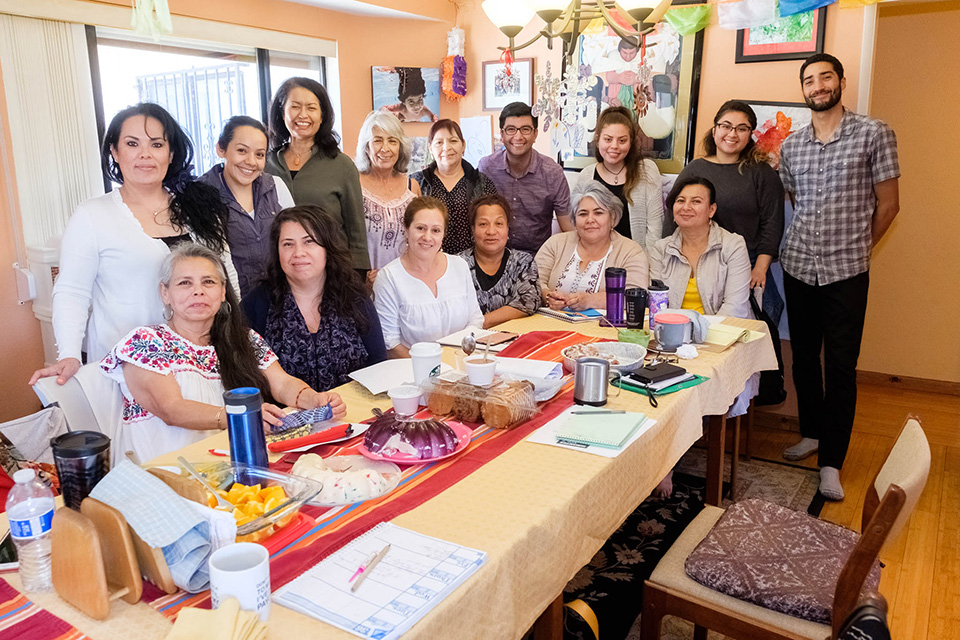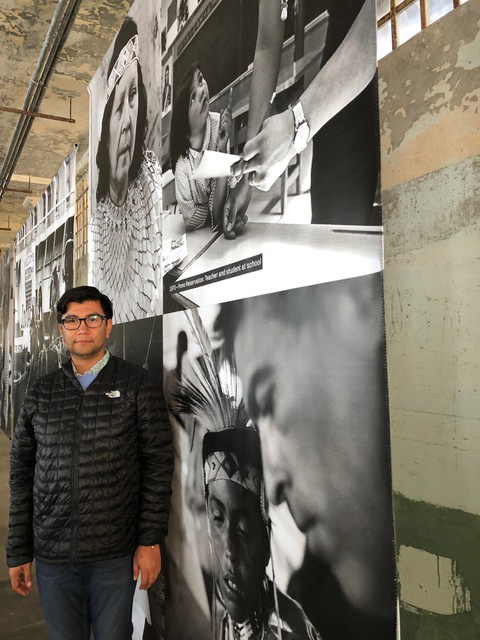Grant Supports Effort to Foster New Generation of Climate Change Leaders

CSUN Chicana/o studies professor Stevie Ruiz, fourth from the right in the second row, with members of Padres Pioneros/Parent Pioneers. Photo taken before the pandemic. Photo courtesy of Stevie Ruiz.
California State University, Northridge Chicano/a studies professor Stevie Ruiz and a team of academics across the country have received nearly $500,000 from The Andrew W. Mellon Foundation to develop a national initiative to foster a new generation of leaders who understand the intersectionality between climate change and the disproportionate impact the COVID-19 pandemic has had on communities of color.
The three-year grant will support the establishment of the initiative, “Climates of Inequality and the COVID Crisis: Building Leadership in Minority Serving Institutions.” Ruiz said the project “opens opportunities to reimagine public humanities pedagogies and practices as tools for shaping this new world and pursuing social justice.”

Stevie Ruiz at the 50th Anniversary commemoration of the Indians of All Tribes Takeover of Alcatraz Island, sponsored by the National Park Service. Photo courtesy of Stevie Ruiz.
“This grant is providing us the support to address the issues faced by those working on the frontlines during this pandemic,” he said.
In addition to CSUN, the initiative includes Rutgers University in New Jersey; Shaw University in North Carolina; University of Illinois in Chicago; University of Puerto Rico, Mayagüez; University of California, Santa Barbara and University of California, Riverside. Together, they make up a national effort called the Humanities Action Lab, a coalition of universities, issue organizations and public spaces in more than 40 cities that collaborate to produce community-curated public humanities projects on urgent social issues.
“Latino communities, Black communities, immigrant communities and the poor have been disproportionately impacted by COVID,” Ruiz said. “They are the essential workers — the farm workers, the meat packers, the warehouse workers, the people who work in the hospitals and who clean up after us. They live in communities with poor air quality, with limited access to parks and recreation, and suffer from higher comorbidity rates. All of which are a byproduct of environmental inequality, and all of which can make COVID-19 much more dangerous.”
He said the physical isolation demanded by the COVID-19 pandemic has exacerbated the “invisibility” of these communities, their stories and their knowledge.
“It also has produced a remarkable opportunity for new connections and inspiration, as a vast majority of people around the world are experiencing aspects of what frontline communities have been confronting for generations,” he said.
At CSUN, students and faculty will be working with the community organization Padres Pioneros/Parent Pioneers to document stories about how these overlooked communities are surviving the pandemic. Among the issues they are dealing with are the loss of jobs, upended school years, fear of asking for help because of immigration status, and families devastated by illness and death due to the virus.
Their solutions, Ruiz said, can be found in community gardens sprouting up to help families deal with tightened food budgets, and in the familial, religious and neighborhood networks that are stepping in to fill in gaps left by government and other agencies.
“There is so much we can learn from these communities,” he said. “We plan to document and share this information, hopefully with public officials and policy makers, so that it can influence future decision making.
“There is a difference between charity and mutual aid,” he continued, “and to understand that and learn how to empower those communities impacted by the pandemic, we need to listen and learn from them.”
Ruiz called pandemics “predictors of climate change.” As more and more of the Earth’s glaciers melt due to the planet’s warming atmosphere, animals and humans are increasingly vulnerable to ancient microbes and viruses once trapped under the ice.
“Pandemics are going to become more and more common as the damage brought on by climate change continues, unless we address the needs of our more vulnerable populations,” he said. “Frontline workers are the first ones that become ill, and the one thing we have learned from COVID is that we cannot do without these essential workers — whether they are meatpackers, farmworkers or hospital workers. We are in a lot of trouble if we don’t have solutions for dealing with the issues that will arise when we have pandemics.”

 experience
experience